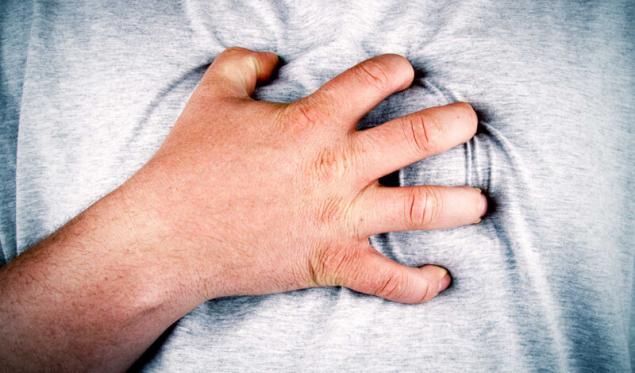470
WHAT happens to the body if You eat when not hungry
Eat when hunger is not in sight — a classic American pastime. Who among us in the form of a bag with shiny fat chips ever replied with a polite refusal: "Thank you, I'm not hungry"? Unfortunately, the diet, when the body physically doesn't need it, not only leads to unpleasant feeling of heaviness, but also fraught with dangerous consequences for health. In a recent survey, 45 students were asked to rate the degree of your hunger before you eat a portion of food with a high content of carbohydrates, which are known to be able to cause a sharp increase of sugar level in the blood. Then, after a meal, glucose levels in the blood of the students were measured after equal intervals of time.
In the result, it was found that the level of sugar in the blood students who before meals have not experienced hunger was higher than those who experienced moderate hunger. Study author David Gal (David Gal), adjunct Professor of marketing at the University of Illinois in Chicago, holds the following views: "When we are not hungry, the body is not ready to absorb nutrients. When we experience hunger, we are more receptive, that is physiologically ready to digest nutrients, including glucose."

A single sharp increase in blood sugar will not kill you. But if such bursts will be repeated over and over again for a long time, the average level of glucose in the blood can remain elevated. The level of glucose is determined during the analysis of the A1C (a blood test for glycosylated hemoglobin). (According to the National Institute of diabetes, digestive diseases, and kidney in The USA (The National Institute of Diabetes and Digestive and Kidney Diseases), the normal ratio below 5.7 percent.)
"If such a dramatic jump glucose level will always occur, in the end, your average level of hemoglobin A1C will rise," said instructor diabetes Tami Ross (Tami Ross) in an interview for the section of questions and answers about diabetes online everyday health (Everyday Health) from 2013. "We know that people with a high level of hemoglobin A1C over time increases the risk of complications, for example, diseases of the cardiovascular system".
Why is there such a need if we are not hungry?
"Modern ambience of consumption", says David Gal, we are "constantly surrounded by information about food."
Food that stimulates brain receptors causing a pleasure — for example, hamburgers, pizza and chocolate — easy to find in restaurants, grocery stores, and supermarkets. Even when we do not eat of this food constantly reminds a TV, or social media. In the end, we want to eat regardless of whether we are hungry or not.
According to another study, there is another reason why we often continue, although not hungry. Researchers from the University of Texas at Austin found thatwe tend to perceive healthy foods as less nutritious, so in the end eat more than you really need.
In order to keep from overeating, David Gal recommends to ignore external stimuli, as, for example, the availability of the chocolates, which are easy to buy directly from the cash shop, and instead listen to the inner signals of the body.
"All we eat, but not because hungry, but because we see something that looks delicious", — says David. "We eat almost on automatic, simply because the food lies before us."
David advises "to look at nutrition from the position of inner feelings — how hungry you are". "And stop eating," he says, "when hunger is no more." published
Translation — Marina Nestrugina
P. S. And remember, only by changing their consumption — together we change the world! ©
Join us in Facebook , Vkontakte, Odnoklassniki
Source: intueat.ru/journal/chto-proishodit-s-telom-esli-vy-edite-kogda-ne-golodny/
In the result, it was found that the level of sugar in the blood students who before meals have not experienced hunger was higher than those who experienced moderate hunger. Study author David Gal (David Gal), adjunct Professor of marketing at the University of Illinois in Chicago, holds the following views: "When we are not hungry, the body is not ready to absorb nutrients. When we experience hunger, we are more receptive, that is physiologically ready to digest nutrients, including glucose."

A single sharp increase in blood sugar will not kill you. But if such bursts will be repeated over and over again for a long time, the average level of glucose in the blood can remain elevated. The level of glucose is determined during the analysis of the A1C (a blood test for glycosylated hemoglobin). (According to the National Institute of diabetes, digestive diseases, and kidney in The USA (The National Institute of Diabetes and Digestive and Kidney Diseases), the normal ratio below 5.7 percent.)
"If such a dramatic jump glucose level will always occur, in the end, your average level of hemoglobin A1C will rise," said instructor diabetes Tami Ross (Tami Ross) in an interview for the section of questions and answers about diabetes online everyday health (Everyday Health) from 2013. "We know that people with a high level of hemoglobin A1C over time increases the risk of complications, for example, diseases of the cardiovascular system".
Why is there such a need if we are not hungry?
"Modern ambience of consumption", says David Gal, we are "constantly surrounded by information about food."
Food that stimulates brain receptors causing a pleasure — for example, hamburgers, pizza and chocolate — easy to find in restaurants, grocery stores, and supermarkets. Even when we do not eat of this food constantly reminds a TV, or social media. In the end, we want to eat regardless of whether we are hungry or not.
According to another study, there is another reason why we often continue, although not hungry. Researchers from the University of Texas at Austin found thatwe tend to perceive healthy foods as less nutritious, so in the end eat more than you really need.
In order to keep from overeating, David Gal recommends to ignore external stimuli, as, for example, the availability of the chocolates, which are easy to buy directly from the cash shop, and instead listen to the inner signals of the body.
"All we eat, but not because hungry, but because we see something that looks delicious", — says David. "We eat almost on automatic, simply because the food lies before us."
David advises "to look at nutrition from the position of inner feelings — how hungry you are". "And stop eating," he says, "when hunger is no more." published
Translation — Marina Nestrugina
P. S. And remember, only by changing their consumption — together we change the world! ©
Join us in Facebook , Vkontakte, Odnoklassniki
Source: intueat.ru/journal/chto-proishodit-s-telom-esli-vy-edite-kogda-ne-golodny/
Saddle time and give up the garbage! Rules of success of Pavel Durov
The unique healing properties of Chlorella























